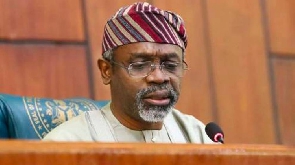The Speaker of the House of Representatives, Femi Gbajabiamila, has said that young people in Nigeria don’t value democracy because their expectations have not been met.
He stated that Nigeria needs a leader that can reassure the youth about democracy being the best alternative.
Mr Gbajabiamila spoke in Abuja on Monday at the opening ceremony of the Legislative Mentorship Initiative for some youth.
The initiative seeks to train 74 selected youth to develop public sector skills.
The speaker said most youth did not experience the military government and have become disillusioned with the incremental progress offered by democracy, stressing that radical changes are required.
He noted that, unlike the older generations that experienced military rule, youth are not inclined to commit to democracy.
“A significant portion of our population today are young people who have no experience of a military government and are not conditioned to see democracy as an absolute good for its own sake.
“They bear no allegiance to politics and politicians, and their judgment of governing systems and institutions is determined by whether those individuals, systems and institutions meet their expectations,” he said.
Mr Gbajabiamila noted that the current attitude of youth to governance and politics is dangerous because it is not backed with knowledge.
“They are not as inclined as generations before them to excuse the failures of democracy because the alternative of military rule is worse. And they will not accept incremental progress when radical reform is necessary and possible.
“There is a danger that this generation embarks on this course without the proper grounding in history, politics, and statecraft necessary to prevent unnecessary pain and worthless suffering,” he said.
To address the problem, Mr Gbajabiamila said there is a need to include youth in politics and governance by giving them a seat at the table.
“Include young people in the political and governing process. We do this by creating avenues for leadership development,” Mr Gbajabiamila stated.
He added that “we must continue our ongoing efforts to improve our electoral processes. Election outcomes must reflect the will of the people, and citizens must have confidence that they can hold political leaders accountable through the ballot box,” he said.
Speaking on the mentorship Programme, the Director General of the National Institute of Legislative and Democratic Study (NLDS), Abubakar Suleiman, said the institute will partner with the organisers of the programme in training and development.
He stated that the legislative arm is the most misunderstood arm of government, not just in Nigeria but around the world.
The British High Commissioner, Catriona Laing, who was represented by the Deputy High Commissioner, Gill Atkinson, said young people must take advantage of the electoral process to vote for the right leaders.
The diplomat urged participants to take advantage of the training and the internship to learn from the leaders. She noted that they must learn the good and the bad.
Nigeria is in the phase of another democratic transition as political parties are in the midst of campaigns ahead of the 2023 elections.
General News of Monday, 3 October 2022
Source: www.premiumtimesng.com













